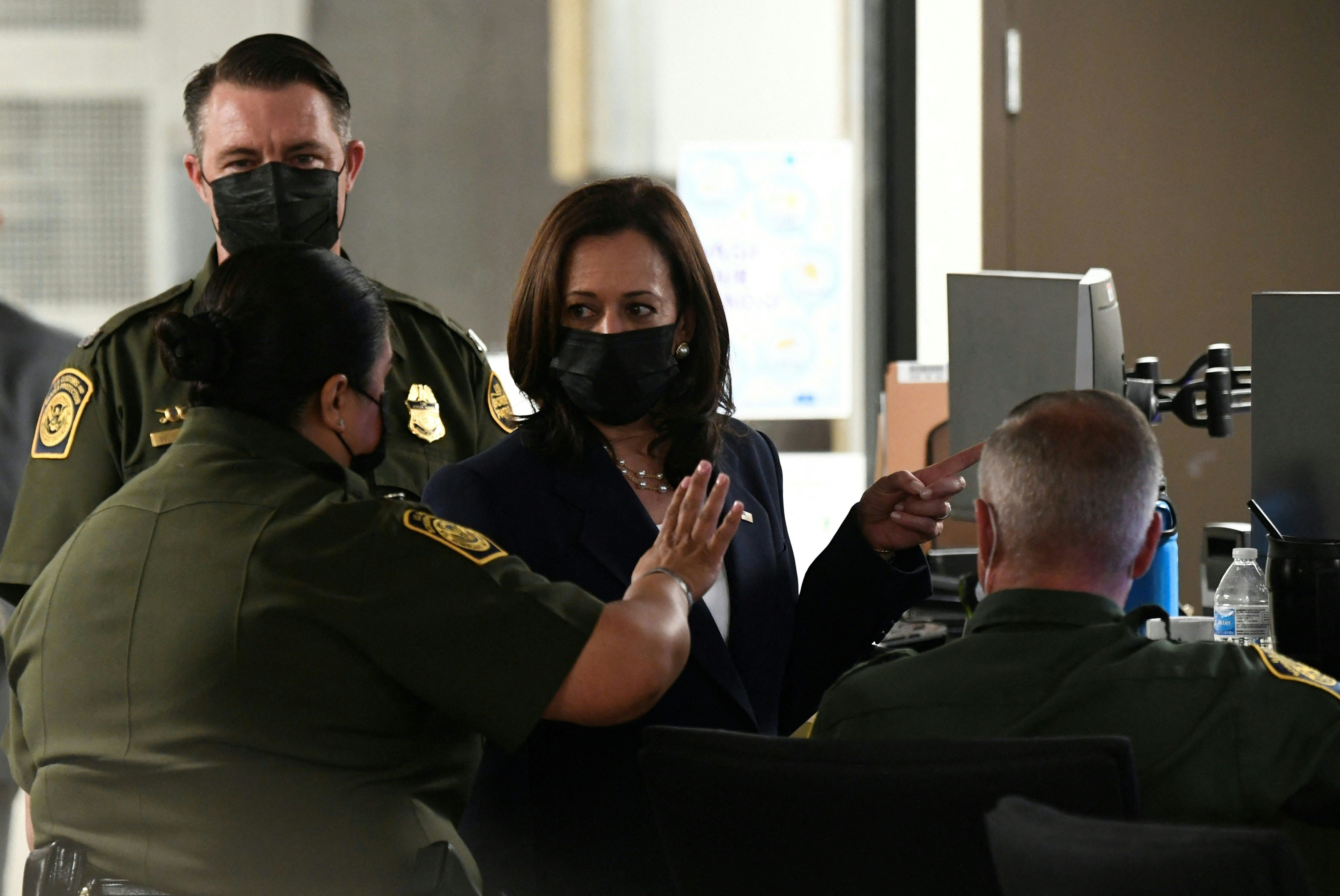Kamala Harris says ‘causes and effects’ of migration both important as she visits US border amid GOP criticism
Biden administration accused of triggering surge in migrants at US-Mexico border
Kamala Harris has said it is essential to study both the “causes and effects” of migration, as she visited the US-Mexico border, amid mounting criticism from Republicans.
On a visit to the city of El Paso, Texas, the vice president sought to deflect criticism over the time it had taken her to visit the border, after President Joe Biden tasked her with addressing the issue of immigration.
Since Mr Biden changed rules set in place by former president, Donald Trump, asylum seekers have been permitted and others have been allowed to wait in the US while their cases are assessed. Previously, they had been made to wait, often for years, in dangerous cities in Mexico.
While immigration activists and NGOs have praised Mr Biden’s move as being more humane, there has been a large increase in the number of people from across Central America and beyond, seeking to cross the border and enter the US.
This has led to criticism from Republicans that Democrats are “soft” on the issue of immigration. Ms Harris, who was tasked in March with “stemming the migration to our southern border” by the president, has been a particular focus for criticism.

“I’m glad to be here. It was always the plan to come here,” Ms Harris said after arriving at El Paso, to meet with with US Border Patrol agents, as well as NGOs. “The reality of it is, that we have to deal with causes, and we have to deal with the effects.”
She added: “I think we’re gonna have a good productive day.”
Criticism of the vice president, from both Republicans and some Democrats, increased after earlier this month she visited Guatemala and Mexico, to talk to the countries’ leaders about how the US could do more to help the poorest nations in the region to stop the flood of migrants.
Countries such as Honduras, Guatemala, and El Salvador, which suffer from widespread poverty, financial insecurity and the impacts of climate change, have for a decade provided the largest number of people seeking a better life in the US.
While Mr Trump insisted the countries themselves, along with Mexico, did more to stop migrants leaving, the Biden administration has said it is essential to also address the root causes that trigger migration.
Read more:
In Guatemala, where she spoke standing next to the country’s president, Alejandro Giammattei, Ms Harris urged people not to leave their homes.
“Do not come. Do not come. The United States will continue to enforce our laws and secure our borders,” she said. “If you come to our border, you will be turned back.”
Rather, she said the US and Guatemala were to work together to find solutions to “long-standing problems”.
She said people must be given a “sense of hope that help is on the way”.
She added: “It must be coupled with relationships of trust. It must be coupled with tangible outcomes, in terms of what we do as leaders to convince people that there is a reason to be hopeful about their future and the future of their children.”
Yet it was an interview with NBC News that created the most controversy. The vice president was asked why she had not yet visited the US border with Mexico, given she had been tasked with the broader immigration portfolio by the president.
Initially she sought to deflect the question, but when she was pressed as to why she had not yet gone she responded: “And I haven’t been to Europe. And I mean, I don’t understand the point that you’re making. I’m not discounting the importance of the border.”

Many observers said the vice president’s team must have known she would be asked the question, and was not prepared with a better answer.
The surge in migrant numbers has overwhelmed border staff, and in places such as the Rio Grande valley, near cities such as Brownsville, authorities have been forced to create makeshift camps to house thousands of child migrants, intercepted by border agents. There is once such facility in El Paso.
El Paso, which sits opposite its Mexican sister city Ciuadad Juarez, has long been an entry point for migrants. In 2019, the Trump administration started what was termed its “Migrant Protection Protocols”, more commonly referred to as the the “Remain in Mexico” policy.
At its core was the acknowledgment that waiting in Mexico to be processed was far less attractive an option than being able to wait in the US, and that would itself act as deterrent to migrants.
“It is here in El Paso that the previous administration's child separation policy was unveiled,” said the vice president.
“We have seen the disaster that resulted from that here in El Paso.”
A few months after the policy was started, The Independent spoke to would-be migrants – none of them from Mexico itself – who were living in the city as the claims were dealt with.
One mother and her two young daughters arrived by bus from El Salvador after her husband, a gang member, was jailed for murdering a teenage girl.
“My parents did not want me to go, but I told them I was going,” she said. “I am afraid to return to El Salvador.”
Additional reporting by Associated Press
Join our commenting forum
Join thought-provoking conversations, follow other Independent readers and see their replies
Comments
Bookmark popover
Removed from bookmarks